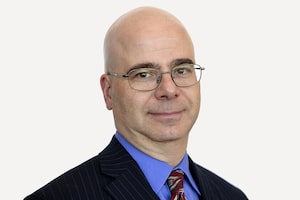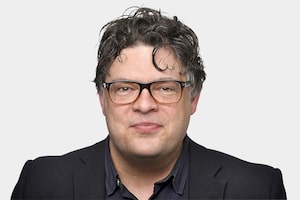Canadian pension fund giant Caisse de dépôt et placement du Québec posted a 13.5-per-cent, benchmark-beating return in 2021 – but the path forward is complicated by Russia’s invasion of Ukraine, Caisse chief executive officer Charles Emond said Thursday.
The economic effects “will be felt for a longer period than even the conflict itself,” Mr. Emond said, citing the inflationary risks to commodities such as oil, combined with the potential dampening of global economic growth.
Caisse spokesperson Kate Monfette told The Globe and Mail on Wednesday before the invasion that the pension fund recently sold hundreds of millions of dollars in stock of seven Russian banks and energy companies that Canada placed sanctions on in 2015.
Russia’s action distracts from a banner 2021, in which the Caisse turned around its real estate returns, negative in the preceding two calendar years.
In its 2021 financial report released on Thursday, the Caisse said its benchmark – the return of a similar portfolio constructed for comparative purposes – was 10.7 per cent in 2021. The spread between the return and the benchmark was the best since 2010, the Caisse said, thanks to strong performances across all portfolios, particularly infrastructure and private equity.
The Caisse ended 2021 with $419.8-billion in assets, making it Canada’s second-largest public-pension investment manager, behind Canada Pension Plan Investment Board. It said $78-billion of its assets are in Quebec.
The annualized returns over five and 10 years were 8.9 per cent and 9.6 per cent respectively, which also outperformed the benchmark portfolio, the Caisse said.
The full-year 2021 showed a 12.4-per-cent return for its Ivanhoé Cambridge property unit. Since early 2020, when the Caisse pledged to sell off a chunk of its shopping-mall portfolio, the pension manager has plowed money into logistics and warehousing, life-sciences-related real estate and select residential projects.
Over the past year, Ivanhoé Cambridge completed more than 100 transactions worth a total of $18.8-billion – $11.9-billion in investments and $6.9-billion in disposals.
“Just to give you a sense, in the 18 months in real estate, we did 170 transactions, and the sectors that we like – industrial logistics and residential – went from 28 per cent to 42 per cent [of the portfolio],” Mr. Emond said in an interview. “The stuff we didn’t like – shopping malls and traditional office – went from 45 per cent to 31 per cent. So we have really repositioned that 180 degrees, and while there’s still work to be done, I’m quite pleased where we are. We’ve broken the back of it for sure.”
Logistics investments included $600-million in Quebec and Ontario via Pure Industrial Real Estate Trust, a venture Caisse co-owns with Blackstone Inc.; nearly $300-million in Moorebank Logistics Park, a large intermodal logistics complex in Australia; and a partnership with URBZ Capital that aims to deploy €400-million in Northern Europe, starting with the acquisition of eight assets in the Netherlands.
Mr. Emond said the Caisse’s business will have a number of challenges in the year ahead. These include climbing interest rates, rising inflation and the energy transition, which is creating “ferocious competition” for assets, he said.
Russia’s invasion of Ukraine will also complicate things for political and business decision makers, he said.
“This conflict will exacerbate an already challenging situation,” Mr. Emond said. He added that the effects will include higher prices for oil and natural gas, as Russia and Ukraine are major exporters of commodities and other products.
“We may see an acceleration of inflation with the rise in natural gases and and rising oil price,” he said. “This is probably going to create further downward pressure on global growth. And so raising rates in that environment is very tricky for the central banks ... if inflation keeps staying there, but growth comes down, everything gets more complicated for everybody.”
On Thursday, Mr. Emond said the Caisse is also working with its outside fund managers to extract Russian equities from global indexes in which it is invested.
The giant Quebec pension fund manager held the shares in the Russian companies when Canada placed them on lists in its Special Economic Measures (Russia) Regulations, developed after Russia invaded the Crimea in Ukraine in 2014.
The regulations prohibited business dealings with individuals and some companies on the list, and banned debt or equity financings of others, including the Caisse holdings. The financing regulations didn’t apply to ownership before the companies were added to the list, meaning the Caisse was free to continue holding its stakes in the Russian companies – which it did through at least the end of 2020, Caisse holdings records indicate. The Caisse would not disclose when it sold the shares.
In its financial report on Thursday, the Caisse said its equity markets portfolio – stocks that trade on public exchanges – gained 16.2 per cent, compared to 16.1 per cent for its benchmark index.
The Caisse’s private equity portfolio posted a 39.2-per-cent return, above the 32.1-per-cent return for its benchmark. The Caisse cited “good positioning in the technology, finance, health care and consumer sectors.”
Fixed income, which accounts for about 30 per cent of the Caisse’s total investments, posted a return of minus 0.6 per cent compared with minus 1.2 per cent for its benchmark.
Its real assets portfolio, which includes real estate and infrastructure and accounts for about 20 per cent of the Caisse’s total portfolio, posted a six-month return of 13.6 per cent, compared with 8.7 per cent for the benchmark index.
The infrastructure portion of real assets reported a 14.5-per-cent return for 2021 – its best in 10 years, the Caisse said – compared to 11.4 per cent for its benchmark index.
Your time is valuable. Have the Top Business Headlines newsletter conveniently delivered to your inbox in the morning or evening. Sign up today.
 David Milstead
David Milstead Nicolas Van Praet
Nicolas Van Praet